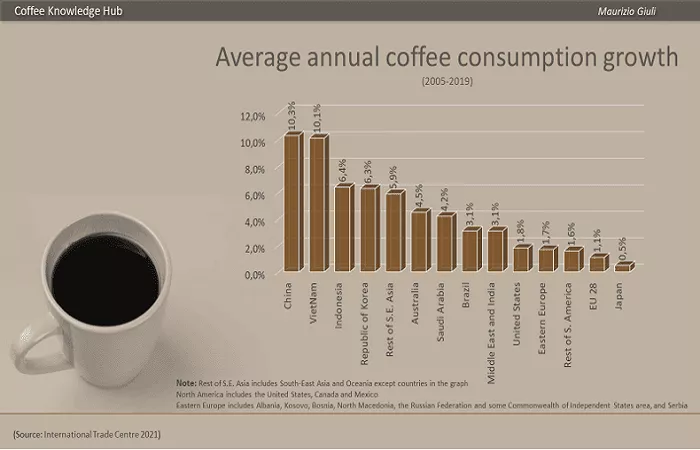The coffee industry has been a significant part of the global economy for centuries. From its origins in Ethiopia to its widespread cultivation in Latin America, Africa, and Asia, coffee has become one of the most traded commodities in the world. But is the coffee industry growing fast? This article will explore the current state of the coffee industry, its growth trends, and the factors driving its expansion.
The Current State of the Coffee Industry
Global Coffee Production
Coffee production is a major economic activity in many countries. According to the International Coffee Organization (ICO), global coffee production reached 169.6 million 60-kilogram bags in the 2020/2021 crop year. This represents a steady increase over the past decade, driven by rising demand and improved agricultural practices.
Coffee Consumption Trends
Coffee consumption has also been on the rise. The ICO reports that global coffee consumption grew by 1.3% in 2020, despite the challenges posed by the COVID-19 pandemic. This growth is attributed to increasing coffee culture in emerging markets, such as China and India, as well as the continued popularity of coffee in traditional markets like the United States and Europe.
Factors Driving the Growth of the Coffee Industry
Increasing Demand for Specialty Coffee
One of the key drivers of growth in the coffee industry is the rising demand for specialty coffee. Specialty coffee refers to high-quality coffee that is sourced from specific regions and produced using meticulous methods. Consumers are increasingly willing to pay a premium for specialty coffee, which has led to the proliferation of specialty coffee shops and artisanal coffee brands.
Expansion of Coffee Shops and Chains
The expansion of coffee shop chains, such as Starbucks, Costa Coffee, and Dunkin’, has also contributed to the growth of the coffee industry. These chains have not only increased the availability of coffee but have also popularized coffee culture worldwide. The convenience and social aspect of coffee shops have made them a popular destination for consumers.
Technological Advancements in Coffee Production
Technological advancements have played a significant role in boosting coffee production. Innovations in farming techniques, such as precision agriculture and sustainable farming practices, have increased yields and improved the quality of coffee beans. Additionally, advancements in coffee processing and brewing technology have enhanced the overall coffee experience for consumers.
Growing Popularity of Ready-to-Drink Coffee
The ready-to-drink (RTD) coffee segment has seen significant growth in recent years. RTD coffee products, such as canned cold brew and coffee energy drinks, offer convenience and portability, making them appealing to busy consumers. The RTD coffee market is expected to continue growing as more companies introduce innovative products to meet consumer demand.
Challenges Facing the Coffee Industry
Climate Change and Its Impact on Coffee Production
Climate change poses a significant threat to coffee production. Rising temperatures, changing rainfall patterns, and increased incidence of pests and diseases are affecting coffee-growing regions. These changes can lead to reduced yields and lower-quality coffee beans, which could impact the industry’s growth.
Price Volatility in the Coffee Market
The coffee market is known for its price volatility. Fluctuations in coffee prices can be caused by various factors, including changes in supply and demand, geopolitical events, and currency fluctuations. Price volatility can create uncertainty for coffee producers and affect their profitability.
Labor Issues in Coffee Farming
Labor is a critical component of coffee production, particularly in countries where coffee is hand-picked. However, labor shortages and poor working conditions are common challenges in the coffee industry. Addressing these issues is essential for ensuring the sustainability of coffee production.
The Future of the Coffee Industry
Sustainable Coffee Production
Sustainability is becoming a key focus in the coffee industry. Consumers are increasingly concerned about the environmental and social impact of their coffee consumption. As a result, many coffee companies are adopting sustainable practices, such as fair trade certification, organic farming, and carbon-neutral production. These initiatives not only benefit the environment but also enhance the reputation of coffee brands.
Innovation in Coffee Products
Innovation will continue to drive the growth of the coffee industry. Companies are exploring new ways to meet consumer preferences, such as developing plant-based coffee alternatives, creating unique flavor profiles, and offering personalized coffee experiences. The integration of technology, such as AI and IoT, in coffee production and brewing is also expected to shape the future of the industry.
Expanding Coffee Markets
Emerging markets, particularly in Asia and Africa, present significant growth opportunities for the coffee industry. As disposable incomes rise and coffee culture spreads, these regions are expected to see increased coffee consumption. Companies that can effectively tap into these markets will be well-positioned for growth.
Conclusion
The coffee industry is indeed growing fast, driven by increasing demand, technological advancements, and the expansion of coffee culture. However, the industry also faces challenges, such as climate change, price volatility, and labor issues. To sustain this growth, the industry must focus on sustainability, innovation, and expanding into new markets. As coffee continues to be a beloved beverage worldwide, the future of the coffee industry looks promising.
This article provides a comprehensive overview of the coffee industry’s growth, highlighting key trends, challenges, and future prospects. By understanding these factors, stakeholders in the coffee industry can make informed decisions to capitalize on growth opportunities and address potential challenges.


